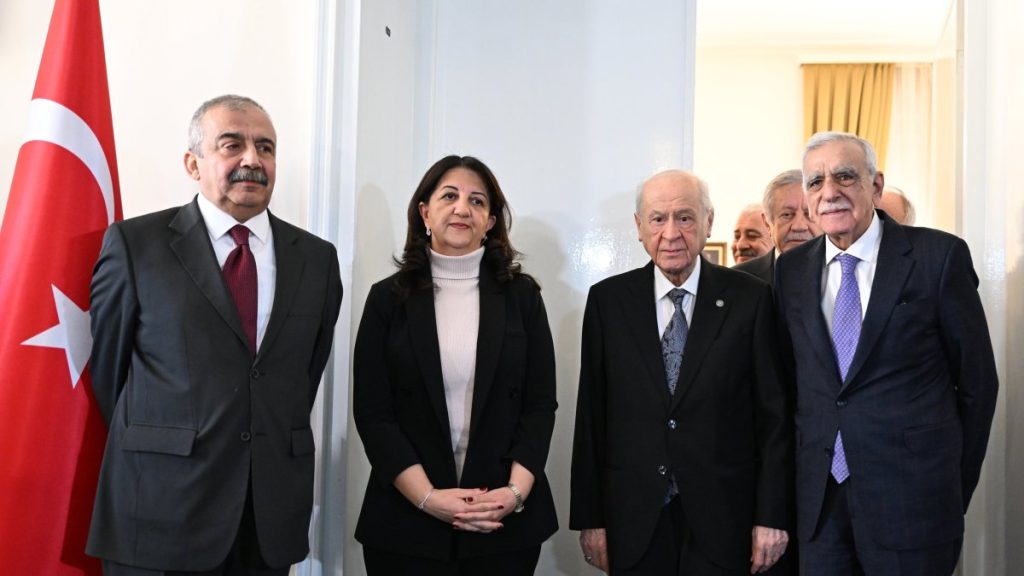Talks between politicians from the PKK-linked Peoples’ Equality and Democracy Party (DEM Party) and jailed leaders of the PKK and the DEM Party’s predecessor, Peoples’ Democratic Party (HDP), have been gathering steam as they try to end 40 years of PKK terrorism in Türkiye.
The latest initiative comes at a time of heightened instability and fundamental changes reshaping the region. These include Israel’s ongoing war on Gaza, the weakening of the Hezbollah movement in Lebanon, and the reconfiguration of power in Syria after the toppling regime of Bashar Assad.
The cautious process was initiated in October by Devlet Bahçeli, a leader of the Nationalist Movement Party (MHP), who has usually opposed any concessions to the PKK.
Since then, the fall of Assad in a lightning anti-regime offensive has triggered intensified fighting between the PKK’s Syrian offshoot, the YPG, and Turkish-backed Syrian National Army (SNA) in northern Syria.
The U.S.-backed YPG/PKK, who have occupied northeast Syria for the past decade, are fighting the Syrian National Army, which has taken back several key towns from the terrorist group in the past month.
Recently, senior members of the DEM Party met jailed PKK leader Abdullah Öcalan and Selahattin Demirtaş, another imprisoned figurehead linked to the PKK. They have also met with the leaders of other political parties to explain their discussions.
The PKK has waged a terror campaign against Türkiye since 1984, initially with the aim of establishing a so-called Kurdish state in the southeast of the country.
The conflict between militants and state forces, which has spread beyond Türkiye’s borders into Iraq and Syria, has killed tens of thousands of people. The PKK is proscribed to be a terror group by Türkiye, the United States and the European Union.
Abdullah Öcalan founded the PKK in the late seventies and spearheaded the campaign of violence, which began with attacks on civilians and military outposts in the early eighties. He fled to Syria in 1979, along with other PKK members, where he remained until 1998, when Syria expelled him under intense pressure from Türkiye.
Öcalan was captured in Kenya in 1999 and imprisoned on Imralı island in the Sea of Marmara, where he remains to this day. His death sentence for treason was commuted to a life term in prison after Türkiye abolished the death penalty.
The 75-year-old is a revered icon and face of the terrorist group, which refers to him simply as “leadership.” While his former lieutenants make up the core of the PKK’s current leadership in northern Iraq’s Qandil region, Öcalan continues to wield influence over the PKK ranks, with past messages relayed through family members or lawyers resonating beyond Türkiye, in Iraq and Syria.
In a message relayed by his nephew in December, Öcalan said he has the power to end the conflict if the conditions are right.
In October, Bahçeli, a close ally of President Recep Tayyip Erdoğan, suggested Öcalan could be granted parole if he renounces violence and disbands the PKK.
It was a major shift for the hardline politician who had previously strongly supported the state’s military action against the terrorist group and its affiliates in neighboring Syria and rejected any notion of negotiation.
Erdoğan appears to have endorsed Bahçeli’s stance.
There is a mixed reaction among politicians and analysts to suggestions of the new initiative. Some describe it as a historic opportunity, while others strongly oppose any perceived notion of leniency toward Öcalan or the PKK.
A recent attack on Türkiye’s key aerospace company outside of Ankara that killed several people was claimed by the PKK, complicating the debate.
There have been several efforts to end the PKK’s campaign between the Turkish state and the PKK over the years, including secret negotiations held in Oslo, Norway from 2009 until 2011. However, none have yielded results.
The last attempt to reach a peace deal took place between 2013 and 2015 with a series of talks between Turkish officials and Öcalan, who declared a cease-fire and withdrew PKK members to bases in northern Iraq.
Turkish officials took steps to improve Kurdish rights, including allowing Kurdish-language broadcasts. The process collapsed in July 2015, after a series of violent attacks by the PKK.


